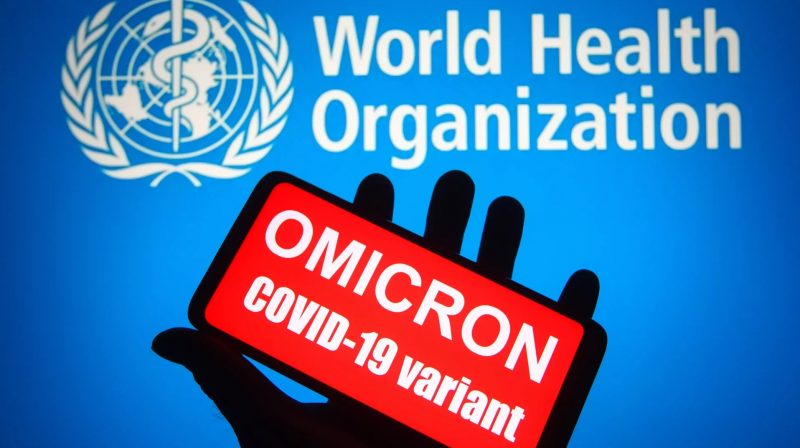Health
Omicron Covid-19 not in Nigeria yet; we’ve ramped up surveillance — FG

… as NCDC prioritises sequencing of samples from SARS-COV-2 positive travellers
As concerns continued to mount over the new variant of COVID-19 designated as variant of concern (VOC) and named Omicron by the World Health Organisation, WHO, the Federal Government on Sunday night reassured Nigerians that the Omicron variant has not been detected in Nigeria.
In a press statement, the Director-General of the Nigeria Centre for Disease Control, NCDC, Dr Ifedayo Adetifa, said the centre is prioritising sequencing of recently accrued samples from SARS-COV-2 positive travellers from all countries, especially those from countries that have reported the Omicron variant already.
Adetifa further urged all States to ensure that sample collection and testing are accessible, so that travelers and people with symptoms or who have been exposed to COVID-19 cases get tested promptly.
“The state notes that the NCDC, through the National Reference Laboratory (NRL) continues to coordinate genomic surveillance and other activities required for the detection of variants.”
READ ALSO:
- Lagos EndSARS Panel was illegal, says Keyamo
- Gidan Gala: Where women, girls are exploited, abused
- Court jails three brothers for Internet fraud, to forfeit SUV, N3.5m
Adetifa also explained that a number of cases have now been reported in the UK, Israel, Botswana, Hong-Kong, Germany, Belgium, Italy and counting but no deaths have been attributed to the new variant yet.
He said: “A total of 126 genomes of this variant have been detected globally and published on GISAID, (GISAID is a global mechanism for sharing sequencing data).
“Given the high number of mutations present in this Omicron variant and the exponential rise in COVID-19 cases observed in South Africa, this virus is considered highly transmissible and may also present an increased risk of reinfection compared to other VOCs.
“However, the fears about its ability to evade protective immune responses and/or its being vaccine resistant are only theoretical so far.
“This virus can still be detected with existing Polymerase Chain Reaction (P”CR) tests.
“The WHO and researchers across the world are working at speed to gain understanding of the likely impact of this variant on the severity of COVID-19 and on the potency of existing vaccines and therapeutics,” he added.
Continuing, he said in collaboration with Port Health Services of the Federal Ministry of Health, enhanced surveillance is ongoing at the airports and points of entry, and to ensure compliance with current travel guidance especially for the day 2 COVID-19 PCR testing.
“Should there be any changes to travel guidance, this will be communicated in due course.
Covid-19 protocols
“Considering the highly likely increased transmissibility of the Omicron variant and its emergence that is linked to unmitigated community transmission of the virus, he urged Nigerians to ensure strict adherence to the proven public health and social measures in place, which are enforceable by the Presidential Steering Committee on COVID-19 (PSC-COVID-19), through the COVID-19 Health Protection Regulations 2021.
“We are collectively responsible for our own health security including playing our part to reduce the risk of the importation or spread of the Omicron variant in Nigeria,”he stated.
READ ALSO:
- Allow Nigerians bear arms for self-defence — AVM Ararile (retd)
- Police, brothel make millions as child prostitution, sex trafficking reign in Osun communities
- FG begins six-day traffic diversion on Lagos-Ibadan Expressway Monday
He implored Nigerians to make every use of the currently available opportunities to get vaccinated against COVID-19, adhere to public health and social measures that have been proven to help prevent SARS-CoV-2 infection regardless of the circulating variant.
He said Nigerians should continue to wear face masks especially in crowded settings, wash their hands regularly, observe physical distancing i.e., keeping a distance of two metres from others, where possible, ensure good ventilation, avoid travel to countries where there is a surge in COVID-19 cases or reported cases of the Omicron variant and avoid all non-essential travel both local and international.
“If you must travel, please adhere to travel protocols instituted by the PSC-COVID-19 which are in place to prevent the risk of importation of the virus or its variants to Nigeria.
“The virus is more likely to spread where people gather and do not adhere to these measures.
“Therefore we appeal to business owners, religious leaders, and people in authority to take responsibility by ensuring people in their premises wear masks and adhere to physical distancing.
“We must do all we can to protect ourselves and our country,” he advised.
Vanguard
Health
Ramadan Health Tips: Six Ways to Stay Hydrated While Fasting

Ramadan Health Tips: Six Ways to Stay Hydrated While Fasting
Staying hydrated during Ramadan is essential for maintaining energy, focus, and overall well-being while observing long hours of fasting. Health experts warn that poor hydration can lead to fatigue, headaches, dizziness, and reduced concentration. Below are six essential, numbered tips to help you stay properly hydrated throughout the holy month:
1. Drink Enough Water Between Iftar and Suhoor
Ensure you consume 6–8 glasses of water between Iftar and Suhoor. Spread your intake gradually instead of drinking large amounts at once, allowing your body to absorb fluids effectively.
2. Break Your Fast With Water
Start Iftar with water to quickly replace fluids lost during the day and prepare your digestive system for food. Avoid sugary or carbonated drinks at this stage, as they can increase thirst later.
READ ALSO:
- Tinubu Urges Senate to Confirm Yusuf for NAHCON, Marafa for INEC
- Galatasaray Stun Juventus 5–2 in UEFA Champions League
- Vinicius Jr’s Wonder Goal Gives Real Madrid Victory Over Benfica
3. Eat Water-Rich Foods
Include fruits and vegetables with high water content, such as watermelon, oranges, cucumbers, tomatoes, lettuce, and soups. These foods support hydration while providing essential nutrients.
4. Reduce Salty, Spicy, and Fried Foods
Limit foods high in salt, oil, and spices, especially at Suhoor, as they increase thirst and can cause dehydration during fasting hours.
5. Limit Caffeine Intake
Reduce consumption of coffee, tea, and energy drinks, as caffeine has a diuretic effect that causes the body to lose more fluids. If taken, balance it with extra water.
6. Never Skip Suhoor
Suhoor plays a crucial role in hydration and energy. Eat a balanced pre-dawn meal that includes water, fruits, vegetables, whole grains, and protein to help sustain you throughout the day.
Maintaining proper hydration during Ramadan fasting helps support digestion, boosts energy levels, and keeps the body functioning optimally throughout the holy month.
Ramadan Health Tips: Six Ways to Stay Hydrated While Fasting
Health
NUFBTE Workers Occupy NAFDAC Lagos Office Over Sachet Alcohol Ban

NUFBTE Workers Occupy NAFDAC Lagos Office Over Sachet Alcohol Ban
Members of the National Union of Food, Beverage and Tobacco Employees (NUFBTE) on Thursday staged a protest at the NAFDAC office in Isolo, Lagos, demanding the reversal of the agency’s ban on sachet and PET-bottled alcoholic beverages. The union claims the ban contradicts a directive reportedly issued by the Federal Government, and they want production lines that were sealed to be immediately reopened.
The protesters, including manufacturers, distributors, and industry workers, argued that the enforcement of the ban threatens jobs, livelihoods, and the operations of small and medium-sized enterprises that rely on sachet alcohol sales. During the demonstration, union members handed a petition to NAFDAC officials, urging dialogue and a more balanced approach that safeguards both public health and the food and beverage sector.
NUFBTE cited alleged instructions from the Office of the Secretary to the Government of the Federation and the Office of the National Security Adviser, claiming that NAFDAC should suspend enforcement. The union said continued closure of production lines and restriction of alcohol sales would lead to economic hardship and widespread job losses.
READ ALSO:
- Naira Could Trade Below ₦1,000/$ With Dangote Refinery at Full Capacity — Otedola
- Adeyanju Urges EFCC, DSS to Probe El-Rufai Over Alleged Corruption, Insecurity in Kaduna
- Granite-Laden Truck Kills Motorist, Leaves Wife Critically Injured in Lekki–Ajah Crash
However, NAFDAC rejected the claims, with Director-General Prof. Mojisola Adeyeye stating that no federal directive has instructed the agency to halt the ban. In a statement, the regulator described circulating reports as “false” and “misleading,” emphasizing that its actions are within statutory authority and in line with official government policies.
“NAFDAC has not received any formal directive to suspend its regulatory or enforcement activities concerning sachet alcohol,” the statement read. The agency reiterated its commitment to public health protection, regulatory compliance, and consumer safety, warning the public and industry stakeholders to rely on verified information from official channels.
The ban, implemented earlier this month, targets alcoholic beverages packaged in sachets and containers smaller than 200ml, a measure aimed at reducing unregulated alcohol consumption and protecting vulnerable groups. While the policy has faced backlash from workers and businesses, NAFDAC maintains that it is necessary for national health and safety.
The protest underscores the tension between regulatory enforcement and economic concerns, as workers continue to call for inclusive policymaking and engagement with industry stakeholders to mitigate the impact on jobs and local businesses.
NUFBTE Workers Occupy NAFDAC Lagos Office Over Sachet Alcohol Ban
Health
NAFDAC Clarifies: No Government Directive to Halt Sachet Alcohol Enforcement

NAFDAC Clarifies: No Government Directive to Halt Sachet Alcohol Enforcement
The National Agency for Food and Drug Administration and Control (NAFDAC) has dismissed reports claiming that the Federal Government ordered a suspension of its enforcement activities against sachet alcohol and 200ml PET bottle alcoholic beverages, describing the reports as “false and misleading.”
In a statement signed by its Director-General, Prof. Mojisola Adeyeye, the agency clarified that it has not received any formal communication from the Federal Government instructing it to halt regulatory or enforcement operations. NAFDAC stressed that all its actions are carried out within its statutory mandate and guided by existing laws and official government directives.
“The said publication is false, misleading, and does not reflect any official communication received by the Agency from the Federal Government,” the statement read. Prof. Adeyeye reiterated that enforcement of regulations on sachet alcohol remains active and any changes to national regulatory policies would be officially communicated through authorised channels.
READ ALSO:
- Suspected IED Explosion Rocks Bayelsa Secretariat, Police Arrest Suspect
- Regina Daniels Shares Emotional Message on Children’s Welfare Amid Custody Battle
- Electricity Workers Serve 21-Day Nationwide Strike Notice to FG
NAFDAC warned that the spread of unverified information can cause public confusion, economic uncertainty, and misinterpretation of government policy. The agency urged the public, industry stakeholders, and the media to rely only on verified information released via its official platforms and government communication channels.
The clarification comes amid ongoing concerns over the public health risks of sachet alcohol, which has been associated with poisoning incidents and misuse, particularly among young people. NAFDAC reiterated its commitment to protecting public health, ensuring compliance in the food and beverage sector, and maintaining national interest while carrying out its regulatory duties.
The agency’s statement underscores that all enforcement operations targeting unsafe alcohol products will continue without interruption, aiming to safeguard consumers and uphold public safety.
NAFDAC Clarifies: No Government Directive to Halt Sachet Alcohol Enforcement
-

 News2 days ago
News2 days agoSaudi Arabia Confirms Sighting of Ramadan Crescent, Fasting Begins Wednesday
-

 metro2 days ago
metro2 days agoLagos Woman Shares Ordeal After Alleged Rape, Sparks Nationwide Outcry
-

 News2 days ago
News2 days agoRamadan Begins in Nigeria as Sultan Confirms Crescent Sighting
-

 metro2 days ago
metro2 days agoSeven Killed in Horrific Crash at Ota Toll Gate
-

 metro2 days ago
metro2 days agoDeadlock at National Assembly as House Snubs Electoral Act Bill Meeting on E-Transmission Clause
-

 News24 hours ago
News24 hours agoKorope Drivers Shut Down Lekki–Epe Expressway Over Lagos Ban (Video)
-

 Health1 day ago
Health1 day agoRamadan Health Tips: Six Ways to Stay Hydrated While Fasting
-

 metro2 days ago
metro2 days agoTroops Intercept ₦37m Terror Funds, Phones, ISWAP Logistics in Borno Operations













